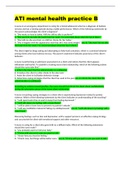Exam (elaborations)
ATI mental health practice B questions and answers all correct
- Course
- Institution
ATI mental health practice B A nurse in an emergency department is caring for a femail adolescent who has a diagnosis of bulimia nervose and has a fainting episode during a ballet performance. Which of the following statements by the parent acknowledges the client's diagnosis? A. "She works so ...
[Show more]



